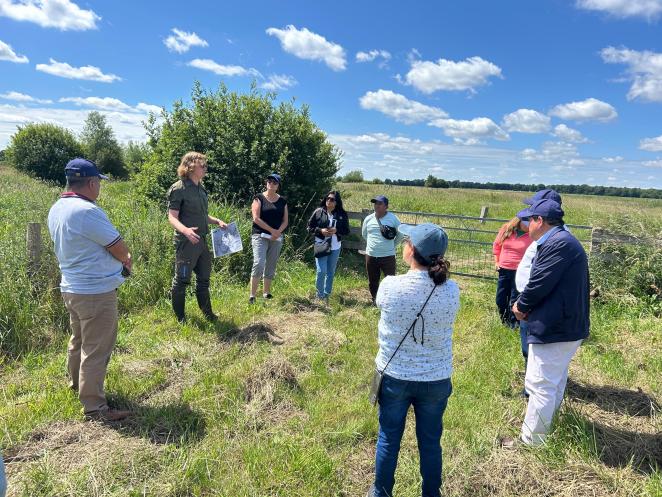In june a delegation from Peru visited the Netherlands as part of the Blue Deal programme led by the Noorderzijlvest Water Authority. The visit focused on the integrated and sustainable approach to water management in the Netherlands — with a special spotlight on the Blue Transition pilot in Veenhuizen.
Together with partners from the Province of Drenthe and nature organisations, Noorderzijlvest shared how they collaborate with farmers to retain more water in the upper parts of the system. During a field visit, the group explored a water retention measure installed in a ditch alongside the farm of one of the participants. Farmer Lambert enthusiastically explained how his nature-friendly ditch bank works, how he manages water use, and then shared ideas for additional measures he’d like to implement after the Blue Transition pilot.
A fun surprise? Lambert also grows Peruvian vegetables for seed multiplication for the European home gardening market — a lovely connection between agriculture, water, and international collaboration!

About the Blue Deal
Worldwide, we're facing many water-related challenges involving too much, too little, or polluted water. These problems know no borders which is why international collaboration is essential. The Blue Deal is the Netherlands’ international programme to help tackle global water issues through long-term partnerships.
The programme focuses on:
- Supporting countries where access to clean, sufficient, and safe water is a major challenge;
- Creating opportunities for both Dutch and local businesses in the water sector;
- Learning from other countries to continuously improve water management at home.
The Blue Deal is a joint initiative of the 21 Dutch Water Authorities, in partnership with the Ministries of Foreign Affairs and Infrastructure & Water Management. It currently consists of 17 partnerships in 15 countries.
This meeting between Blue Deal and Blue Transition illustrates how international knowledge exchange and local collaboration go hand in hand to build resilient water systems for the future.
